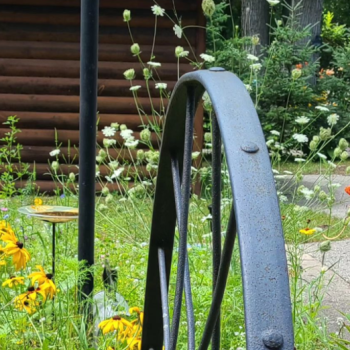Forgiveness is layered. It can be given in an offhanded fashion—or painfully and formally—and still take years to take root in our hearts. At other times, we can feel that we will never be able to forgive. It may take years or decades. On this side of the grave it may remain a painfully incomplete experience.
This is not just because healing takes time. Forgiveness is also a long journey, because forgiveness is not something we do. We become forgiving. And because only God can forgive readily and fully, we can only live into it. We can't check it off a list. That is why the death of our parents is an invitation to a journey, not the invitation to do anything.
Death brings us into the presence of God, who can readily and fully forgive, who sees things as they are and who sees us as we are. If, at the moment of your parent's death, there are wounds that are unhealed, I would urge you to sit with those wounds, not just in the presence of the one who hurt you, but in the presence of the One who knows us all.
If you can't forgive, if it isn't time yet, let go instead. Leave the growth of forgiveness to God.
We can be controlled and overwhelmed by people who hurt us. We can also be controlled and overwhelmed by our anger with the one who tried to hurt us. Neither one is the life that God wants to give us.
Be gentle with yourself.
Fourth: the death of our parents can remind us that there is a difference between a family of chance and a family of choice.
This may seem to be contradictory with what I've said thus far. But part of being human and not God—part of living in a world where we are all granted the power to choose and none of can choose for others—is recognizing that we cannot change other people. Love can only conquer someone if they are willing to be conquered. Forgiveness is sometimes a bridge that is built from only one side of a ravine.
There are people in this world with whom we cannot connect deeply. There are people in this world who are dangerous or poisonous to us. And there are people who are unmoved by our efforts to love them.
Sometimes those people are members of our family. They may be our parents. They may be our siblings.
Blood ties create the presumption that we have a lot in common and that we ought to be close to one another. Sadly, they are no guarantee. Differences in nature, birth order, experience, and personal choice make that inevitable. In a sense, then, our family members are as much a result of chance as are the people we meet on the street.
Families are meant to be a gift, a source of comfort, strength, support, and love. The presumption that what they should be is what they must be, drives some of us to make those relationships work at risk to our own emotional, physical, and spiritual well-being.
When that happens, it is time to look for those gifts in a family of choice, rather than in our family of chance. Build and nurture relationships that will be a place where you can draw closer to God and others in love.
Finally: the death of our parents is an invitation to trust.
Trust God. Trust God with your loved ones. Trust God with your own life. Trust God in their brokenness and in ours.
My students ask me if I believe in purgatory. I've often said, I doubt that there is a place, as such, by that name. I am also fairly sure that it isn't the dire place of soul-cleansing brutality that the medieval church imagined (although I am equally sure that we modern, post-modern whatevers short-sell the benefits of soul-cleansing).
But I do believe that we all will have homework to do in heaven.
Life always has loose ends and messy endings. There are words left unsaid and things left undone. There are times when that list includes some of life's more important elements, among them children and parents who can't bring themselves to say, "I love you," "I'm sorry," "I forgive you."
Even under the best of circumstances and in the best of families, there remains the necessarily incomplete journey that is the journey into God. How could it be any other way, if we are who we are—God's children—and if God is who God is?
But if God loved us enough to look for us in this life, God will not abandon us in the next one. The grave—in all its apparent finality—is not the end.
Trust in God's goodness. Trust God with the loose, ragged endings, the unresolved conflicts, and the unanswered questions. Trust one another to God.





